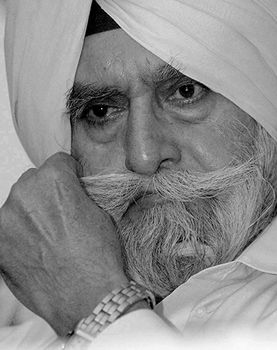The Sikhs have always been a martial community, and many have worn their patriotism with pride on their epaulettes. Those who tilled the land volunteered to feed the soldiers. Jai Jawan, Jai Kisan, was not just another slogan.
 K.P.S. Gill (December 29, 1934—May 26, 2017)
K.P.S. Gill (December 29, 1934—May 26, 2017)
When K.P.S. Gill took over as chief of the Punjab Police, militancy was at its peak, and the memory of Operation Blue Star, still raw. People lived by the moment, and the system had halted under the fear of terrorism. The police were in a dilemma as the terrorists were their own kin.
Gill, a cerebral officer, had his own ideas of policing, counter-insurgency operations and conflict management. He also had a short deadline to restore normalcy, reestablish the rule of law, put in place an elected government and send the forces back to the barracks.
Standing tall in his uniform, with a stern expression on his face, Gill had his doors open for all. Many tip offs—from political leaders to frightened petty officials, from former panchayat members to affected villagers who were forced to shelter terrorists—came directly to him.
Gill incentivised the police and the public with huge rewards on the heads of the most dreaded terrorists. This galvanised everyone, and the results started showing. As the police chased and killed terrorists in real encounters, Gill had the Army cordon off the killing fields, where the thickets and bushes that once gave the militants cover were cropped close to the ground.
Gill took good care of his forces. Their kids were sent to high-fenced police public schools under heavy security cover. He even chose to gloss over some of the acts of corruption, so long as those involved remained committed to cleaning up Punjab of the last traces of terrorism.
His own task went beyond motivating his forces and reassuring the public. He would talk to all kinds of politicians, urge them to go out and meet people, hold rallies as if all was well. With the judiciary, he was at once persuasive and harsh as he thought it was the most spineless organ of the state.
Gill’s planning and execution of Operation Black Thunder was the first of its kind in a state where religion and politics are inextricably linked. To flush out militants who had been holed up in the Golden Temple, he did the very opposite of what was done during Operation Blue Star when battle tanks were sent into the shrine. Gill sealed off the area around the Golden Temple and cut off water, power and other supplies. Those who still stayed back desecrated the shrine themselves, in full public view as the operation was almost telecast live! The casualties were minimum, the surrenders many! As the priests and the public saw who desecrated the temples, they never confronted Gill. The clergy did not hold him guilty of crimes against Sikhism, thus sparing him the religious punishment it meted out to former president Zail Singh and former Union minister Buta Singh.
Gill helped many surrendered militants return to normal life. Many of them as well as people who gave tip offs were shifted out of Punjab in what was almost a perfect witness protection programme. The need to hold elections were first articulated by Gill, who believed the police had only a limited role in the long run. Punjab today remains largely peaceful thanks to the fortitude and farsightedness of Gill.







